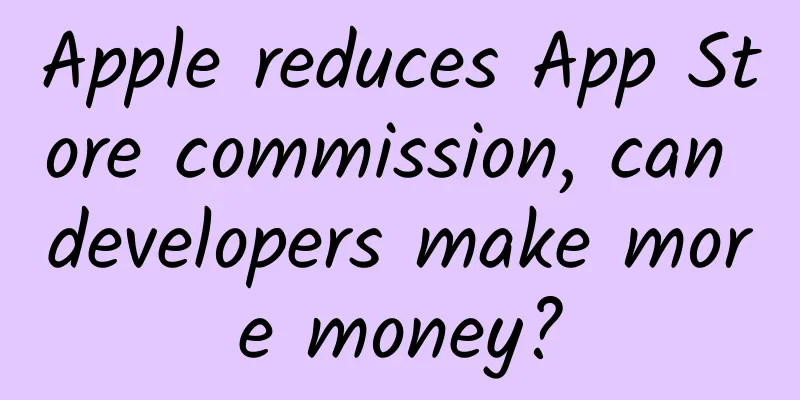Apple reduces App Store commission, can developers make more money?

|
"You set up a stall on my turf and I collect rent from you." The App Store's commission-collecting strategy is no secret to Apple. Simply put, if your product sells for 100 yuan on the App Store, you can get 70 yuan, and Apple will take 30 yuan as commission. This 30% commission rate is now a very public figure. However, starting next year, developers may be able to make more money.
Apple has officially announced a new initiative, the App Store Small Business Program, which aims to reduce the commission rate for some iOS app developers. The basic content of this measure is that starting from January 1, 2021, if the developer's annual revenue is less than 1 million US dollars, their commission rate will be reduced from 30% to 15%, so that they can enjoy greater discounts. While the full details of the program won't be announced until early December, the basic criteria for participation are pretty straightforward:
In other words, as long as the developer's revenue from the App Store after deducting the share of the revenue in 2020, which is about to end, is less than 1 million US dollars, then they can immediately enjoy a preferential commission rate of 15% starting from January 1 next year. But if, next year or later, the annual revenue exceeds $1 million at some point, the revenue for the remaining period will be recalculated based on the original commission rate of 30%. If the developer's revenue drops from over $1 million to under $1 million, they can enjoy the 15% preferential commission again the following year. In short, $1 million is a guaranteed limit, and as long as you don’t exceed this limit, you can continue to enjoy the 50% commission reduction offer.The reduction in commission rates has made Apple developers eager to spread the word, which is also a manifestation of the fact that "the world has suffered from Apple for a long time." Is a 30% commission reasonable? It’s hard to say. As a software developer, they certainly hope that the ratio is as low as possible. But from Apple’s point of view, as the world’s number one application platform, is it too much to charge 30% commission? It doesn’t seem to be too much.
Epic vs. Apple. Image via: Gamerant All along, both medium and large developers and individual developers have followed Apple's rules, but over time, there will always be people who jump out and try to challenge Apple. I believe you all know that in the middle of this year, Epic, the developer of the popular game "Fortnite", went to court with Apple because it was unwilling to accept the commission rate and tried to bypass Apple Store payment (and also sued Google because Play Store has the same commission rate). This matter caused a sensation on the Internet. Some people stood on Epic's side and thought that Apple was the "evil dragon" and Epic was the warrior challenging the dragon. Some people stood on Apple's side and thought that Epic was relying on the popularity of the game and did not want to pay the "rent". Apple even banned Epic's developer account on August 28.
Fortnite In the end, the court ruled that both parties should compromise. Epic's "Fortnite" cannot be listed on Apple's App Store, and Apple has no right to ban Epic's developer account. This matter has come to an end for the time being. Although Epic did not win in the end, it did create a public opinion field, making the commission collection, which was originally a matter between practitioners, suddenly attract attention outside the circle because it affected a large number of ordinary game users. Perhaps from that time on, Apple has been thinking about how to reformulate its commission collection policy. In fact, judging from this new policy, Apple is still very smart. It did not adopt a one-size-fits-all approach to reduce the commission rate, but instead attracted the vast number of small and medium-sized developers who have an absolute advantage in numbers. After appeasing them, the "basic base" of large developers was suddenly divided into two classes, with the "rich" paying more and the "poor" paying less . The gradient design was more flexible and also ensured that Apple's revenue in this regard would not drop too much.
Google Play Store This move by Apple is a kind of destruction of the industry's "unwritten rules". In fact, it is not just Apple. Google's Play Store also has a commission rate of 30%. Sony PlayStation, Amazon App Store, Samsung Galaxy Store, Microsoft Store, Nintendo eShop, etc. all use the same commission structure as Apple. Although it is not fair to target Apple, Apple is the big brother after all. However, at least Google, as a direct competing platform, should be in a difficult situation. Whether this will be a new beginning for the industry to adjust commission ratios remains to be seen. Let’s look back at the domestic situation. When Apple has reached a commission ratio of 15:85, most domestic Android channels still maintain a commission ratio of 5:5. Could it be that domestic Android channels are "gritting their teeth and sucking blood, killing people like flies"? But in fact, the situation at home and abroad is different. On application platforms like Apple App Store and Google Play Store abroad, the commission is pure commission. Apple and Google will not do any additional promotion. Paying money is just "collecting rent." In the domestic Android distribution channels, although the 50-50 commission ratio is very high, there are various ratings for domestic channels, and the channels themselves also have KPIs. For those games that are not competitive and do not have their own distribution capabilities, domestic Android channels will actively promote them in the early stage of listing, thereby gaining relatively large exposure, which saves developers some promotion costs. But for the top developers, like Tencent, they have their own traffic and no shortage of attention. A 50-50 split is like cutting meat directly on the heart. Game media GameLook reported that in 2019, Tencent officially launched a campaign against the channel with several high-quality games such as "Jian Wang 3: Fingertip Jianghu", demanding a 3:7 profit-sharing strategy. At that time, Huawei and Xiaomi stores quickly compromised, while OPPO and vivo stores did not put the games on the shelves. However, I just searched again and found that these games can be found in the app stores of OPPO and vivo. They should have also accepted the profit-sharing requirements proposed by Tencent. But one thing we have to mention is that the servers of games in different distribution channels are actually different. The games on these distribution channels are what we commonly call "channel servers". Not only are the price settings of in-app purchases and other items different from those of non-channel servers, but the data is also not synchronized with non-channel servers. There are also various problems such as induced downloads. We have mentioned this before in the article "It’s okay that iPhone and Android game data are not interoperable, but why can’t they be connected even if they are both Android?" In addition, due to the large differences between the domestic mobile game ecosystem and the application ecosystem, the above 5:5 split is mainly concentrated on game distribution. As for the application commission ratio, according to a post by V2EX community user imac1988 in 2018: Tencent, Huawei, Xiaomi, and Alibaba (Wandoujia, etc.) all take 30% commission. In addition, Baidu stipulates that if the app revenue is less than 500,000, it will be charged 30%, and if it exceeds 500,000, it will be charged 50%. If the revenue of 360 is less than 500,000 in the first three months, then it will not be charged in the first three months. The specific amount after that is unclear, but it should be 30% according to the market. In addition, no relevant information can be found in the app markets of OPPO, vivo, etc. Basically, it is better to keep pace with the international standards. This is also because domestic mobile phones have risen and are sold all over the world. Many applications may be available in all regions. It is also a safer approach to maintain a commission deduction strategy that is relatively consistent with the world. In fact, in the past year or so, the platform has been under greater pressure than ever before. Not only have the voices criticizing Apple's App Store and other platforms become louder and louder, but in September last year, developers who were dissatisfied with Apple's commission method also established the Coalition For App Fairness.
In China, the distribution of game channels has gradually shifted from the original hardware channels and third-party channels to vertical channels such as Bilibili and TapTap. In general, the future is increasingly favorable for small and medium-sized developers, and they are more motivated to develop better applications and high-quality independent games. This will keep developers active and give ordinary users more choices. "Small businesses are the backbone of our global economy," Apple CEO Tim Cook said in a statement about the strategy. Hopefully Apple can get this right. |
<<: How to book COVID-19 vaccine with Alipay? How to book vaccine online
Recommend
A preliminary study of Carthage: four advantages and four disadvantages
[[140844]] Carthage is a package management tool ...
Xiaomi's accumulation of momentum and climb
Xiaomi has also embarked on the path of cooperati...
Alibaba's autonomous driving route begins to take shape: Wang Gang leads the team, L4 takes the lead
The rumors began to be verified more and more. Th...
Property management should be free in the Internet age
When free becomes a "business card" in ...
Is there any scientific basis for the belief that head circumference determines IQ?
"Big Head Son, Small Head Father" is a ...
Maria Goeppert-Meyer, the "Onion Madonna" who deciphered the structure of the atomic nucleus
February 20, 2022 marks the 50th anniversary of M...
If you lose your teeth, you can use medicine to grow them back. This new research may benefit many people in the future.
Maybe the teeth that fall out can grow back in th...
Many people don’t know all these things about wine!
Autumn is the season for grape harvest. Grapes ca...
Why can e-commerce mini programs break the bottleneck of merchant development?
With the rise of mobile Internet, the development...
He spent $40 million to create new bacteria and wanted to create new life. It turned out that he was trying to...
Nobel Prize winner and famous physicist Richard F...
Mobile games are rushing to gain market share during the summer vacation. Missing out on these channels means missing out on millions of users!
It's summer vacation again, and this year'...
Community Operation丨The essence and gameplay of "private domain traffic" in 2019!
Last year, every time I attended a marketing indu...
Uncovering the technical principles of the "Star Wars" robot BB-8
This should be one of the most watched non-human ...
From martial arts novels to programmer interviews
[[140576]] summary Inspired by The Sword Stained ...
Mercedes-Benz to invest 40 billion euros in the next eight years to build eight battery cell factories to accelerate electrification transformation
At present, many countries and regions around the...









